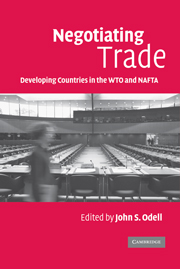Book contents
- Frontmatter
- Contents
- List of figures
- List of tables
- List of contributors
- Acknowledgments
- 1 Introduction
- Part I Multilateral negotiations
- 2 The evolution of national interests: new issues and North–South negotiations during the Uruguay Round
- 3 Reframing the issue: the WTO coalition on intellectual property and public health, 2001
- 4 The strict distributive strategy for a bargaining coalition: the Like Minded Group in the World Trade Organization, 1998–2001
- 5 Learning in multilateral trade negotiations: some results from simulation for developing countries
- Part II Regional negotiations
- Part III WTO Dispute Settlement Negotiations
- Index
5 - Learning in multilateral trade negotiations: some results from simulation for developing countries
Published online by Cambridge University Press: 22 September 2009
- Frontmatter
- Contents
- List of figures
- List of tables
- List of contributors
- Acknowledgments
- 1 Introduction
- Part I Multilateral negotiations
- 2 The evolution of national interests: new issues and North–South negotiations during the Uruguay Round
- 3 Reframing the issue: the WTO coalition on intellectual property and public health, 2001
- 4 The strict distributive strategy for a bargaining coalition: the Like Minded Group in the World Trade Organization, 1998–2001
- 5 Learning in multilateral trade negotiations: some results from simulation for developing countries
- Part II Regional negotiations
- Part III WTO Dispute Settlement Negotiations
- Index
Summary
Introduction
Whereas there are still many gaps in our understanding of negotiation processes, one well-established pattern is that the way negotiators communicate and interpret information does matter. It codetermines both the process and outcome of bargaining. In the study of international negotiations, authors have particularly focused on how actors behave when they have, at the beginning of the process, limited information regarding the resources, resolve, and domestic context of their negotiating partners. A large body of literature has explored such situations with the use of formal game-theoretic analytical tools, making use of so-called incomplete information models to see how limited information can influence actors' strategies. Incomplete information about domestic politics has been a particular focus of study, especially since the advent of the two-level game metaphor, which gave a new start to an older research tradition on domestic politics and international negotiations. Authors have paid particular attention to the influence of domestic feasibility sets, win-sets in Putnam's words, on international negotiations, starting from the assumption that negotiators can never, or at least very rarely, exactly know the domestic constraints of their counterparts, and may also have difficulty with their own constraints. While such recent formal work has helped to better determine the conditions of applicability of Schelling's famous theory of strength in (domestic) weakness, that question remains problematic, to say the least, for many analysts, observers and practitioners of international negotiations. We see two main reasons for this.
- Type
- Chapter
- Information
- Negotiating TradeDeveloping Countries in the WTO and NAFTA, pp. 145 - 174Publisher: Cambridge University PressPrint publication year: 2006
- 3
- Cited by



